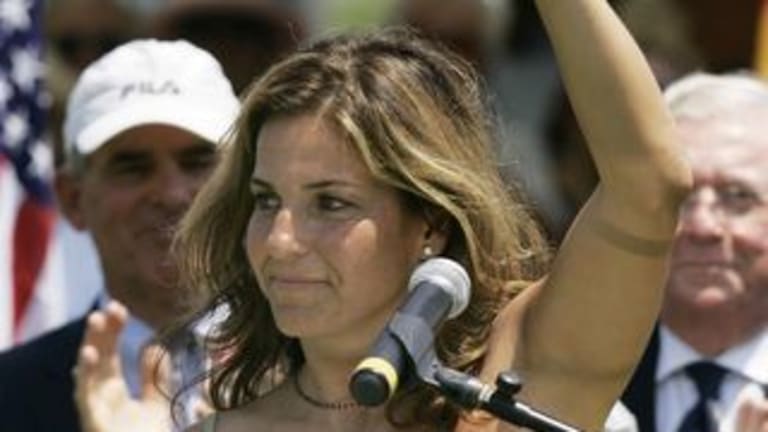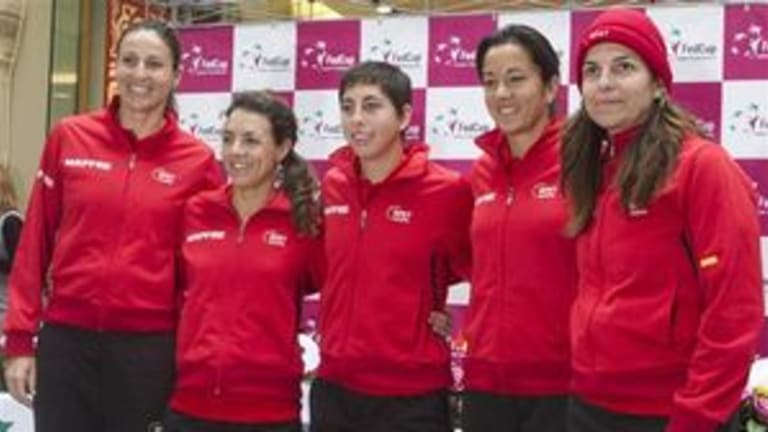The irony would be exquisite if it were not so fundamentally sad. As her results and fame skyrocketed, Arantxa Sanchez officially added a hyphen and her mother's maiden name (Vicario) to her own. Some rolled their eyes; it seemed a pretentious thing to do, even if Arantxa Sanchez did sound a little too much like the Spanish equivalent of Jane Smith.
In the ensuing years, Marisa Vicario Sanchez became a permanent fixture in the player's box at tournaments around the world, and she got more than her share of face time on television—even if she usually seemed like nothing more than a nicely-dressed, dispassionate matron. And there is Marisa Vicario Sanchez, whose name Arantxa added out of love and respect for her mother, the commentors would say. She seems like such a calm, stable presence in Arantxa's lfe. . .
You half-expected at any moment to see Marisa pull the knitting out of her bag and proceed to hum a tune as her oldest daughter (from among four children) elevated scampering, dashing, tireless retrieving tennis to an art form—thereby earning the nickname, the Barcelona Bumblebee, and in the process overshadowing even her well-known tennis-playing brothers, Emilio and Javier.
Neither of those boys ever came within sniffing distance of a Grand Slam singles title; Arantxa, by contrast, won four, and she did in an era when her competition included Grand Slam champions Mary Pierce, Gabriela Sabatini, Monica Seles, and perhaps the greatest female singles champion of all time, Steffi Graf.
Arantxa won the first—and most startling—of those titles to become the youngest French Open singles champ (age 17) up to that time (1989) at Roland Garros. In the final, she outlasted and outran Graf, 7-6 (6), 3-6, 7-5.
But Matt Cronin recently reported here at TENNIS.com that, according to Arantxa's forthcoming book,Arantxa, Vamos! Memoirs of a Struggle, a Life and a Woman, Marisa was less the benign and much-needed chaperone of a relatively simple-minded youngster than, well, a thief—one who made off, with the complicity of Arantxa's father, with their daughter's riches, of which there was no shortage.
Arantxa earned almost $17 million in her 17-year career. She put her career haul, including endorsement monies, at close to $60 million. And why not throw those numbers out there, as all they are anymore is numbers. "Today," Aranxta told the Spanish magazine La Otra Conica, "I am without resources."
I'm not in the habit of blaming victims for the crimes, official or otherwise, perpetrated against them. But Arantxa's claims seem so outlandish that you have to wonder if this isn't all some kind of ploy in the former No. 1's ongoing battle with the Spanish equivalent of the IRS (they are after her for fraudulently claiming residency in Andorra through four of her glory years, beginning not coincidentally in 1989). Or if there isn't a lot more to this story than we know.
While Emilio Sanchez, the more successful of her brothers, was a good-looking showman who often seemed more interested in making amazing shots than converting break points. He was never spoken of as anything but the quintessential "nice guy." But that's neither here nor there; applied the way it was to Emilio, "nice" isn't necessarily synonymous with anything you would call principled or courageous, nevermind noble. It just means the guy is attractive, doesn't rock the boat, and says all the right things at the right time—including "hello" when he passes you in the hall.
So it was also surprising when Arantxa told La Otra Conica that she has no relations with anyone in her family, including her brothers, and emphatically declared: "My parents left me with nothing and now I am indebted to the IRS and I will not be quiet."
If impotence can be heartfelt, she's accomplished it. It's tough to accept her revelations as unvarnished truth, but there doesn't seem to be any other way to take them. Her family also opposed her recent, second marriage, to Jose "Pep" Santacana. If he put her up to this, so be it. It's either true or not, more or less. The word I keep coming back to is, "sad."
Sad and shocking, yes. but the situation isn't entirely inconceivable, either—not when you look back on Arantxa in her glory days (she's Spain's Fed Cup captain now; that's her on the far right in the image below).
Arantxa was the quintessential tomboy. Her officially listed height was 5-foot-7 but she seemed shorter than that, and she was surprisingly stocky for one who moved so quickly and energetically. With that steel ball-holding device she wore on the small of her back she looked like a wind-up toy, the Energizer Bunny.

